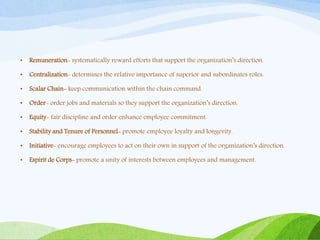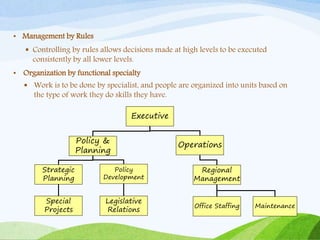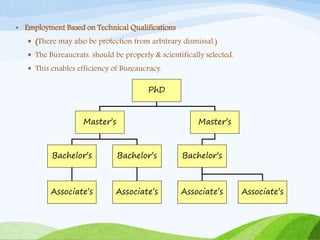Administrative management
- 2. INTRODUCTION • HENRY FAYOL (Istanbul, 29 July 1841 – Paris, 19 November 1925) is a French mining engineer, mining executive, author and director of mines who developed general theory of business administration that is often called FAYOLISM. • Father of Modern Management • Published a book and summarizing his management experiences: • 5 Management Functions Planning Organizing Commanding Coordinating Controlling
- 3. 14 Principles of Management • Division of Work- divide work into specialized tasks and assign responsibilities to specific individuals. • Authority- delegate authority along with responsibility. • Discipline- make expectation clear and punish violations. • Unity of Command- each employee should be assigned to only one supervisor. • Unity of Direction- employee efforts should be focused on achieving organizational objectives. • Subordination of Individual- the interests of one person should not take priority over the interests of the organization as a whole.
- 4. • Remuneration- systematically reward efforts that support the organization’s direction. • Centralization- determines the relative importance of superior and subordinates roles. • Scalar Chain- keep communication within the chain command. • Order- order jobs and materials so they support the organization’s direction. • Equity- fair discipline and order enhance employee commitment. • Stability and Tenure of Personnel- promote employee loyalty and longevity. • Initiative- encourage employees to act on their own in support of the organization’s direction. • Espirit de Corps- promote a unity of interests between employees and management.
- 5. Maximilian Karl Emil "Max" Weber • Is a German sociologist who introduces the idea of a bureaucratic organization. • The aim of this concept is to create an organization that has the authority structures with a clear procedure of rules and regulations. • Bureaucracy can be defined as a and efficient form of organization founded on logic, order, and legitimate authority.
- 6. Characteristic of Bureaucracy based on Weber’s 6 Major Principles: Hierarchy, based on authority Sample Model of Hierarchy Highest Office High OfficeHigh Office Low Office Low Office Low Office Lowest Office Lowest Office Lowest Office Lowest Office Hierarchy Each level controls the level below and is controlled by the level above. A formal hierarchy is the basis of central planning and centralized decision making.
- 7. • Management by Rules Controlling by rules allows decisions made at high levels to be executed consistently by all lower levels. • Organization by functional specialty Work is to be done by specialist, and people are organized into units based on the type of work they do skills they have. Executive Operations Policy & Planning Strategic Planning Policy Development Regional Management Special Projects Legislative Relations Office Staffing Maintenance
- 8. • An “Up-focused” or “In-focused” Mission If the mission is described as “up-focused”, then the organization’s purpose is to serve the stockholders, the board, or whatever agency empowered it. If the mission is to serve the organization itself, and those within it, e.g., to produce high profits, to gain market share, or to produce a cash stream, then the mission is described as “in-focused”. • Purposely Impersonal The idea is to treat all employees equally and customers equally, and not be influenced by individual differences.
- 9. • Employment Based on Technical Qualifications (There may also be protection from arbitrary dismissal.) The Bureaucrats. should be properly & scientifically selected. This enables efficiency of Bureaucracy. PhD Master’sMaster’s Bachelor’s Bachelor’s Bachelor’s Associate’s Associate’s Associate’s Associate’s
- 11. Elton Mayo (1880-1994) Behavioral Theory • Is a researcher who conducted studies in Hawthorne Works Plant of Western Electric in Chicago. • He led a team who developed a research project known as Hawthorne Studies. • The researchers concluded that the workers performed well when they know they are part of the experiment and when they are being observed by the researchers. • This effect is known as the Hawthorne Effect. • The team also concluded that psychological and social factors are more important than physical condition of the workplace and financial incentives in motivating workers.
- 12. THE END… THANK YOU !!!!











